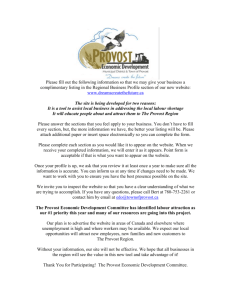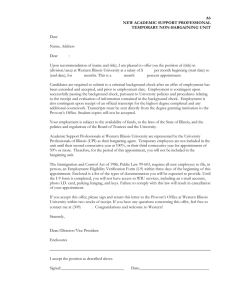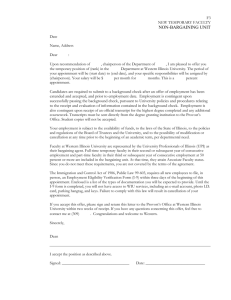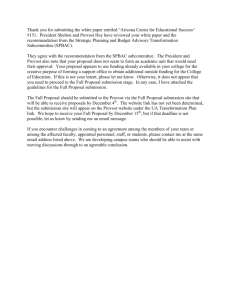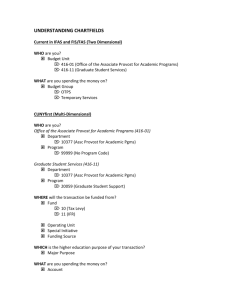Update of the Executive Committee’s “Distinctions in Expectations and Responsibilities... Senior Library Specialist, Library Operations Associate, Academic Professional, and Library...
advertisement
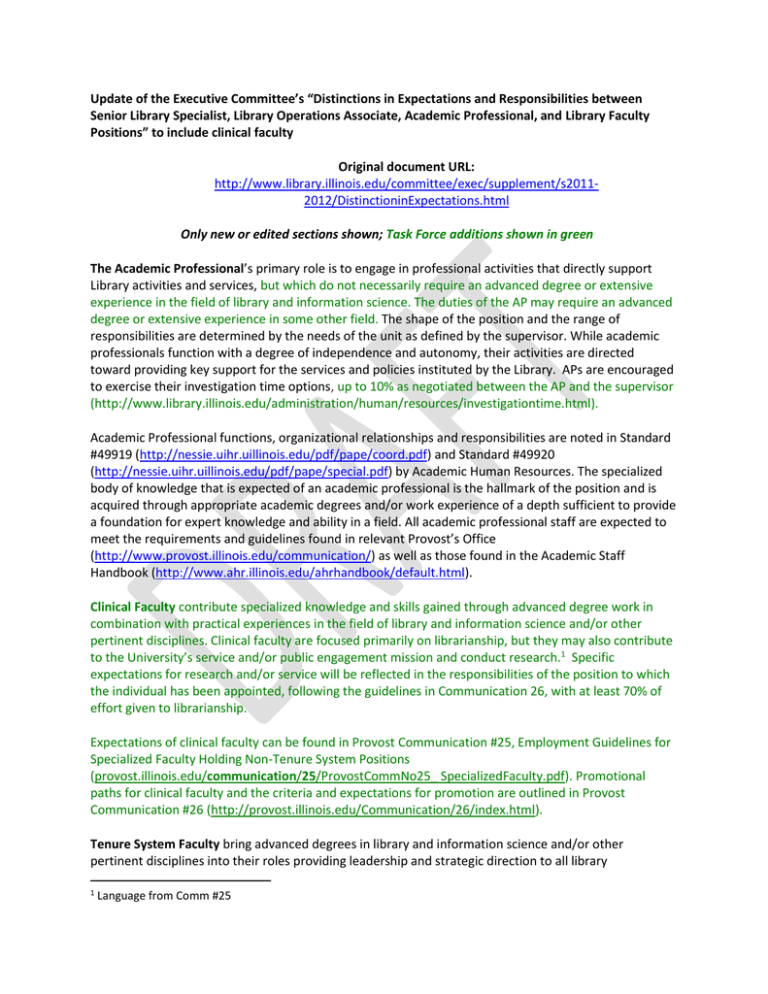
Update of the Executive Committee’s “Distinctions in Expectations and Responsibilities between Senior Library Specialist, Library Operations Associate, Academic Professional, and Library Faculty Positions” to include clinical faculty Original document URL: http://www.library.illinois.edu/committee/exec/supplement/s20112012/DistinctioninExpectations.html Only new or edited sections shown; Task Force additions shown in green The Academic Professional’s primary role is to engage in professional activities that directly support Library activities and services, but which do not necessarily require an advanced degree or extensive experience in the field of library and information science. The duties of the AP may require an advanced degree or extensive experience in some other field. The shape of the position and the range of responsibilities are determined by the needs of the unit as defined by the supervisor. While academic professionals function with a degree of independence and autonomy, their activities are directed toward providing key support for the services and policies instituted by the Library. APs are encouraged to exercise their investigation time options, up to 10% as negotiated between the AP and the supervisor (http://www.library.illinois.edu/administration/human/resources/investigationtime.html). Academic Professional functions, organizational relationships and responsibilities are noted in Standard #49919 (http://nessie.uihr.uillinois.edu/pdf/pape/coord.pdf) and Standard #49920 (http://nessie.uihr.uillinois.edu/pdf/pape/special.pdf) by Academic Human Resources. The specialized body of knowledge that is expected of an academic professional is the hallmark of the position and is acquired through appropriate academic degrees and/or work experience of a depth sufficient to provide a foundation for expert knowledge and ability in a field. All academic professional staff are expected to meet the requirements and guidelines found in relevant Provost’s Office (http://www.provost.illinois.edu/communication/) as well as those found in the Academic Staff Handbook (http://www.ahr.illinois.edu/ahrhandbook/default.html). Clinical Faculty contribute specialized knowledge and skills gained through advanced degree work in combination with practical experiences in the field of library and information science and/or other pertinent disciplines. Clinical faculty are focused primarily on librarianship, but they may also contribute to the University’s service and/or public engagement mission and conduct research.1 Specific expectations for research and/or service will be reflected in the responsibilities of the position to which the individual has been appointed, following the guidelines in Communication 26, with at least 70% of effort given to librarianship. Expectations of clinical faculty can be found in Provost Communication #25, Employment Guidelines for Specialized Faculty Holding Non-Tenure System Positions (provost.illinois.edu/communication/25/ProvostCommNo25_ SpecializedFaculty.pdf). Promotional paths for clinical faculty and the criteria and expectations for promotion are outlined in Provost Communication #26 (http://provost.illinois.edu/Communication/26/index.html). Tenure System Faculty bring advanced degrees in library and information science and/or other pertinent disciplines into their roles providing leadership and strategic direction to all library 1 Language from Comm #25 activities. A critical function of the tenure system faculty, both individually and as a whole, is to set policy within the Library and to help shape the larger academic policy on Campus. They both investigate and create best practices in the field through varying combinations of their librarianship, research, and service activities. Tenure system faculty lead and design innovative and collaborative programs, services, and teaching initiatives.2 In addition, tenure system faculty members engage in service work that benefits the Library, the campus, the community, and the profession. All tenure system tenured and tenure-track faculty members are expected to meet the requirements and guidelines found in Article IX of the Statutes, Communications Number 9 and Communication Number 13 from the Office of the Provost, found in relevant Communications from the Provost’s Office (http://www.provost.illinois.edu/communication/) and those found in the Academic Staff Handbook (http://www.ahr.illinois.edu/ahrhandbook/default.html). All Library faculty, both clinical and tenure system, work within the overarching Library administrative structure and under the parameters set forth in their job description to design, implement, and support Library activities and services. Under these parameters, faculty function autonomously and independently within their positions while at the same time they work collegially and cooperatively to fulfill the mission of their unit, the Library, and campus. Library faculty members have a responsibility to work with members of their units to achieve the articulated goals for that unit and the Library as a whole. Library faculty members define their own research agenda, including both theoretical and applied research. The Library provides basic support, including research time and a small travel budget, to enable the development of this research agenda, and faculty members are encouraged to seek additional support from University and external sources to fulfill their research responsibilities. The distinctions between these position classifications are real, definable, and sustainable. Careful adherence to the principles of the positions can provide both protection and opportunities for all members of the community to meet the needs of the Library. 2 Language from Library Statement on Promotion and Tenure
